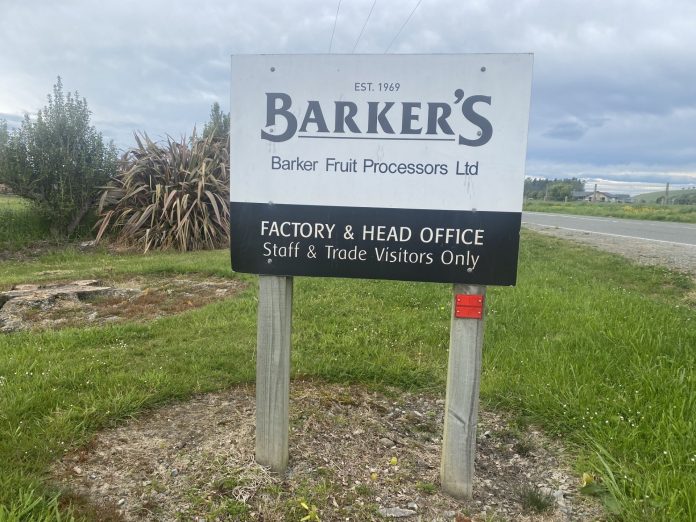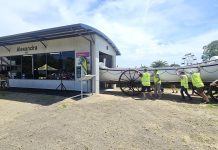
Disgruntled neighbours of Geraldine food processor Barkers are seeking reassurance they won’t be left in a pickle.
Property owners on blocks next to the factory are concerned about the company’s plans for wastewater discharge from the newly expanded factory, which is expected to be producing product by the end of this year.
While the food processor continued to operate on the Barker family farm, it was now fully-owned by French multinational Andros Group.
Barkers has said processing capacity is expected to double from 14,000 tonnes of fruit and vegetables to 28,000 tonnes a year.
Until April this year, wastewater from the factory had been sent to a settling pond where the liquid was then diverted to irrigate a nearby Department of Conservation (Doc) block.
However the concession to irrigate that block was not renewed.
Andros Group bought about 14.5 hectares of land in Shaw Rd in South Canterbury’s Pleasant Valley for more than $1.4m.
The purchase was made under the Overseas Investment Act, and the land would be used for irrigation and would become the site of an experimental orchard.
But before that could begin, the organisation was waiting on consent from Environment Canterbury (ECan).
Neighbour Mike Froger said he and his partner Kate Berridge had no inkling about the factory’s wastewater problems until they had spotted an article about it online.
The couple had bought their house near the factory two years ago. They had not been scared off by living near the factory, as back then the expansion was simply a pipe dream.
And besides, there was a forestry block between them.
However the consent named that forestry block as part of the land expected to be irrigated by 75 million litres of wastewater.
He said the consent application did not mention of any treatment of the water.
‘‘Several of the neighbours are farmers with a long history and understanding of this area. They’re additionally worried about run-off into waterways, and damage to groundwater.’’
Barker’s chief executive Agnes Baekelandt said the new land was ‘‘absolutely’’ able to absorb the amount of wastewater involved, ‘‘even allowing for soil rest and rotation periods’’.
‘‘The system we designed — permanent micro-irrigation is a best practice for industry wastewater of our strength.’’
She said before making the decision, Barkers had engaged with ECan and Arowhenua.
‘‘We undertook extensive soil testing and irrigation modelling, via a well-respected firm of environmental consultants.’’
Mr Froger said when he and other neighbours were finally met by Barkers — after an article had been published online — no-one would answer directly as to why Doc was no longer allowing them to irrigate.
He said the business’s lack of a clear answer made them suspicious about the proposal before them.
Ms Baekelandt said: ‘‘We understand that our neighbours can have concerns, and we should have engaged with them much earlier to build trust and reassurance. We want to be good neighbours and we need better communication.’’
When Doc was approached for a comment about Barker’s no longer being able to irrigate their wastewater on their parcel of land, its regional operations manager Darryn Ratana said the organisation had invited Barkers to resubmit the concession application.
‘‘The decision to decline the concession was due to several things including the adverse effects of the industrial wastewater discharge, containing sodium hydroxide causing a build-up of salt in the soil,’’ Mr Ratana said.
Ms Baekelandt said the business planned to develop an experimental orchard that would enable horticulture development in the region.
The company was still in the last steps of the consent with ECan, and she said they would comply with any additional conditions that ECan might request.
Mr Froger said he and Ms Berridge were not anti-Barkers.
‘‘We’re not against them. We’re not against science,’’ Mr Froger said.
‘‘We’re against pretending a low-cost shortcut is best practice.
‘‘Data in the consent application shows that the wastewater can have a very high BOD [Biochemical Oxygen Demand] — in fact it is stated that it is too high to go in the municipal system as it is.
‘‘It really concerns us that the consent mentions nothing regarding pre-treatment to reduce that BOD before they spray it on to the forest.’’
When she was asked whether the factory wastewater would now be treated, Ms Baekelandt said the business planned to discharge the wastewater fresh to avoid any sludge buildup in the ponds.
‘‘The new system will be automated so that irrigation can be controlled to lightly spread the water, matching the application rate to the soil’s ability to absorb and treat the system,’’ Ms Baekelandt said.
‘‘The use of land treatment has a low carbon footprint, allowing the soil to beneficially reuse the nutrients and organic matter for plant growth.
‘‘We will use the ponds only during very high rain events [25mm] and during cold soil temperature.
‘‘The current factory upgrade will have improved pumping and screening to reduce further the solids loading to the pond.
‘‘Only the small pond should be needed to buffer the flows, this can be mixed to keep solids in suspension with this volume — blended with the fresh factory water.’’
Mr Froger remained doubtful.
He said in France the company had promoted an orchard irrigation project using factory waste, but it was under much tighter regulation.
‘‘The great thing about the internet is that you can literally dig out the French consent for that project. In that case, the consent says they are required to treat the wastewater first.’’
‘‘Biological treatment, filtration, pH control — so it meets French standards for reuse. They are required to apply the cleaned wastewater at less than one-third the water volume that Barker’s is proposing here. And it looks like they’re required to monitor BOD, sodium, pH the whole time. That’s the standard. So why are they proposing a lesser solution here?’’
He said Andros Groups CEO Florian Delmas wrote a book called Planete A, Plan B.
‘‘In his book Delmas talks about regenerative agriculture, soil health, and corporate ethics.
‘‘Well, here’s his chance . . . If he believes his own words, then Geraldine should get the same standard of care France gets. At absolute minimum.’’
Ms Baekelandt said Barkers was ‘‘currently heavily investing in best environmental practices’’.
‘‘For irrigation. For waste generation. For water usage reduction. For energy savings. For carbon emission (we decreased our carbon footprint by 87% in the past two years).
‘‘Saying that we are not living up to environmental commitments highlights a very narrow view.’’




